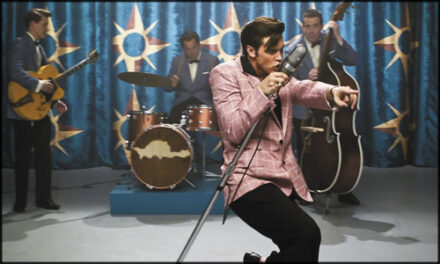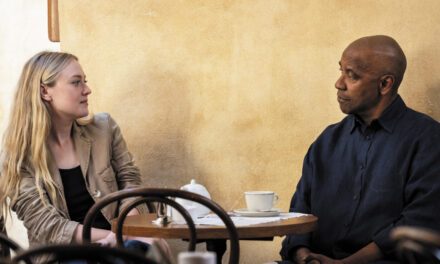
Bad Times At The
El Royale (** ½) R
I kept looking for it. Surely, I thought to myself, Quentin Tarantino must be listed somewhere in the credits for writer/director Drew Goddard’s film Bad Times At The El Royale. I mean, after all, this is a film that blatantly steals from Mr. Tarantino, a filmmaker who has also been known to borrow an element or two from other cinematic influences in his own movie career. Complaints have been lodged against the latter filmmaker over the years for not giving credit where credit is clearly due but it seems that Goddard might be picking up that mantle and running with it as well.
Goddard is so in love with Tarantino, and to a lesser extent, the Coen Brothers, that their fingerprints are all over Goddard’s latest film even if they weren’t involved. Goddard even goes so far as to give his film individual chapter headings, a practice that Tarantino has steadfastly followed throughout most of his career. If only Goddard had Tarantino’s talent then we might have some to really talk about here but, alas, that’s not the case.
Jeff Bridges in Bad Times At The El Royale
Drew Goddard’s first film, Cabin in the Woods, pleased most critics and has become a bit of a cult favorite in the intervening years since its spring 2012 release. I felt that film was average at best so it wasn’t as if I was salivating for Goddard’s follow up feature. Bad Times proves to be exactly what I expected and nothing more, a lot of style over substance.
What makes this effort different is that Goddard seems to be intent on testing his audience’s level of patience whereas his previous effort didn’t overstay its welcome. Scenes in this film go on endlessly and even repeat themselves for no apparent reason other than the fact the director seems to have never met a scene he could shorten. If there were some profundity lying at the bottom of all of this maybe I could be a bit more forgiving but this is clearly a classic case of the emperor having no clothes.
Bad Times relates the circa 1969 tale of a group of strangers who wind up at the hotel of the film’s title for various reasons. They are represented by such talents as Jeff Bridges, Dakota Johnson and Jon Hamm, to name a few. Each has their own agenda and secret reasons as to why they are there but it takes forever for things to become even remotely interesting. The occasional revelation and plot twist keeps things from becoming a total disaster but it’s not enough to make up for Goddard’s shameless pretentiousness as a filmmaker. It’s a real shame to see a project with such potential collapse under the weight of a filmmaker’s vanity but that appears to be what has transpired.
First Man (***) PG-13
The biopic of astronaut Neil Armstrong, First Man, is a curious example of a filmmaker’s approach to the material being at odds with the story being told. Here we have a true-life story bursting at the seams with emotion. And yet the filmmaker behind the material, the usually dependable Damien Chazelle, seems intent on keeping the audience objective and largely emotionally uninvolved for large sections of the film’s running time, save a few scenes during the final stretch.
Along the way there are some amazing recreations of iconic moments from the early days of the NASA space program but taken as a whole First Man doesn’t achieve the heights I was expecting. I will readily concede, however, that there’s much to behold in this flawed but interesting film.
Ryan Gosling in First Man
First Man is the kind of biopic that takes only a portion of its subject’s life as opposed to the cradle to grave approach. The story takes place during the years of 1961-69, inevitably ending with Armstrong’s triumphant moon landing. In the interim, director Chazelle and writer Josh Singer, scripting from James R. Hansen’s book, attempt to show us what drove the astronaut to immerse himself in his work to the detriment of those who loved him. The film’s chief strength is Ryan Gosling, an actor who can pull off just about anything. It’s up to him to carry the film in his portrayal of Neil Armstrong and he manages to achieve that handsomely. As depicted in the film’s script, Armstrong is a man haunted by the memories of his deceased daughter but insists on maintaining his steely emotional reserve. He’s closed off as a human being and has mastered the art of keeping his emotions at bay quite effectively. Gosling does a fine job articulating the inner conflict that dwells within Armstrong.
While we’re on the subject of the film’s casting I’ll just say that there are some great choices on tap here offering Gosling support. Claire Foy does a terrific job as Armstrong’s long-suffering wife and she is given the task of igniting most of the emotional fireworks found in the film. There are also such familiar and capable faces as Kyle Chandler, Jason Clarke, Lukas Haas and Corey Stoll. All are good to excellent.
The biggest problem with the film is that it seems to be at odds with itself, not being able to decide whether it should be a straight procedural or a depiction of a man’s emotional crisis. Chazelle directs the technical stuff with a sure hand but the film seems to flounder at times in the scenes not dealing with Armstrong’s work and the reasons as to why he buried himself in his profession. As a result First Man isn’t quite the home run that many might be anticipating from the this acclaimed filmmaker.
‘Bad Times’ and First Man open in Hickory this Friday.
Questions or comments? Write Adam at [email protected].







